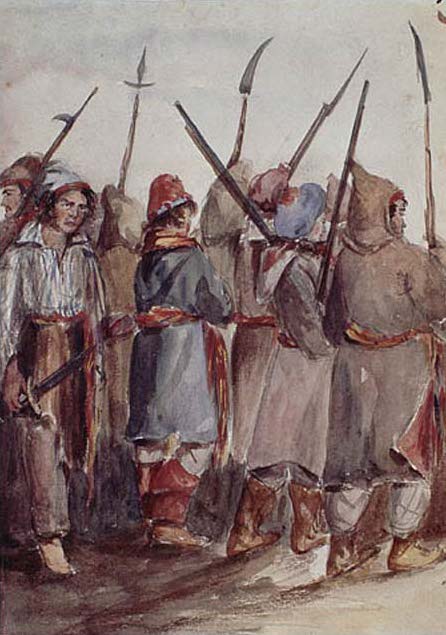|
Armenian Fedayi
''Fedayi'' (Western hy, Ֆէտայի ''Fedayi''; Eastern hy, Ֆիդայի ''Fidayi''), also known as the Armenian irregular units or Armenian militia, were Armenian civilians who voluntarily left their families to form self-defense units and irregular armed bands in reaction to the mass murder of Armenians and the pillage of Armenian villages by criminals, Kurdish gangs, Turkish forces, and Hamidian guards during the reign of Ottoman Sultan Abdul Hamid II in late 19th and early 20th centuries, known as the Hamidian massacres. Their ultimate goal was always to gain Armenian autonomy (Armenakans) or independence (Dashnaks, Hunchaks) depending on their ideology and the degree of oppression visited on Armenians. Some of the key Fedayi figures also participated in the Iranian Constitutional Revolution that commenced during the same period, upon agreement of the ARF leaders. The Armenian term ''fedayi'' is ultimately derived from Arabic fedayeen: ''fidā'īyūn'', literally ... [...More Info...] [...Related Items...] OR: [Wikipedia] [Google] [Baidu] |
Armenian Revolutionary Federation
The Armenian Revolutionary Federation ( hy, Հայ Յեղափոխական Դաշնակցութիւն, ՀՅԴ ( classical spelling), abbr. ARF or ARF-D) also known as Dashnaktsutyun (collectively referred to as Dashnaks for short), is an Armenian nationalist and socialist political party founded in 1890 in Tiflis, Russian Empire (now Tbilisi, Georgia) by Christapor Mikaelian, Stepan Zorian, and Simon Zavarian. Today the party operates in Armenia, Artsakh, Lebanon, Iran and in countries where the Armenian diaspora is present. Although it has long been the most influential political party in the Armenian diaspora, it has a comparatively smaller presence in modern-day Armenia. As of October 2021, the party was represented in three national parliaments with ten seats in the National Assembly of Armenia, three seats in the National Assembly of Artsakh and three seats in the Parliament of Lebanon as part of the March 8 Alliance. The ARF has traditionally advocated socia ... [...More Info...] [...Related Items...] OR: [Wikipedia] [Google] [Baidu] |
Irregular Military
Irregular military is any non-standard military component that is distinct from a country's national armed forces. Being defined by exclusion, there is significant variance in what comes under the term. It can refer to the type of military organization, or to the type of tactics used. An irregular military organization is one which is not part of the regular army organization. Without standard military unit organization, various more general names are often used; such organizations may be called a ''troop'', ''group'', ''unit'', ''column'', ''band'', or ''force''. Irregulars are soldiers or warriors that are members of these organizations, or are members of special military units that employ irregular military tactics. This also applies to irregular infantry and irregular cavalry units. Irregular warfare is warfare employing the tactics commonly used by irregular military organizations. This involves avoiding large-scale combat, and focusing on small, stealthy, hit-and-ru ... [...More Info...] [...Related Items...] OR: [Wikipedia] [Google] [Baidu] |
.png)
